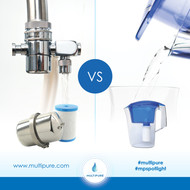Faucet-Mount Filters Versus Filtered Water Pitchers
Posted by Kenton Jones on Mar 30th 2021
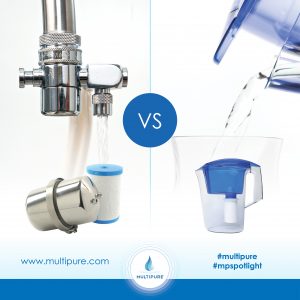
Multipure’s May 2020 Spotlight is “Comparing Water Treatment Technologies,” so to start it off, we are going to take a look at two very common consumer water treatment products: faucet-mount filters and filtered water pitchers.
Filtered water pitchers are arguably the most common and most basic of water treatment products, and their low price matches their low degree of performance. They are designed to improve the taste and odor of your water.
Faucet-mount filters can be subdivided further into self-contained faucet mount filters, such as a PUR faucet-mount filter, and countertop
drinking water systems, like a countertop Aqualuxe drinking water system.
- Self-contained faucet mount filters are a modest step up from filtered water pitchers, reflected in a slightly higher price and slightly greater filter capabilities. While many are designed only to improve the taste and odor of your water, other models also reduce the presence of some harmful contaminants.
- Countertop drinking water systems represent the top-tier of faucet-mounted water treatment products. They tend to be more expensive than the other options, but their price is more than justified by their vastly greater performance. A countertop drinking water system like Multipure’s Aqualuxe is NSF-certified to improve the taste and odor of your water and reduce the presence of heavy metals (lead), volatile organic compounds (VOCs), pesticides, herbicides, PFOAs, microplastics, pharmaceuticals, and even bacteria and viruses.
The short version: If you’re primarily concerned with the taste and odor of your water, then a filtered water pitcher or self-contained faucet-mount filter may be an acceptable water treatment option. If you want something that will protect your water from a broad spectrum of contaminants that can be harmful to your health, then a countertop drinking water system will be your best choice.
Let’s explore these options further:
Filtered Water Pitchers
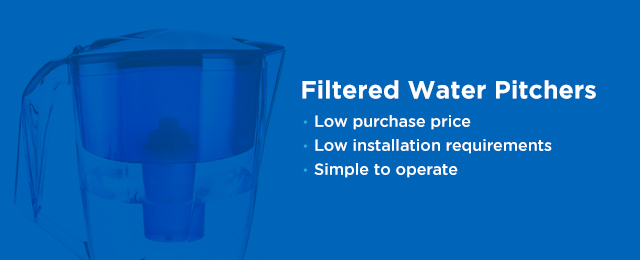
First, let’s take a look at filtered water pitchers. These are commonly sold in most supermarkets and department stores and are known to be relatively inexpensive and easy to use.
- Low purchase price: Most filtered water pitchers typically retail for less than $50.
- Low installation requirements: Filtered water pitcher installation typically only requires that the filter be properly inserted into the pitcher.
- Simple to operate: Fill the top half with tap water, and the water will passively be filtered as it passes through the filter cartridge into the bottom half.
How do filtered water pitchers perform?
- Filtered water pitchers utilize granular activated carbon (GAC) as their filtration medium. This allows larger particulate matter to be trapped by the GAC, while certain contaminants that affect the taste and odor of the water, such as chlorine, are adsorbed by the carbon granules.
- Because the GAC consists of loose particles, water can pass through the filter fairly quickly, and the filter does not require power or active water pressure – gravity is enough for the water to pass through the filter.
- Filtered water pitchers do not waste water – all the water passes through the filter and is usable.
- Some filtered water pitchers are effective for filtering out metals like lead, copper, and mercury, chemicals like chlorine and pesticides, and organic compounds that impart an unpleasant taste and smell to the water.
What are the downsides to filtered water pitchers?
- GAC is a loose collection of granules, so water can form a channel over time and bypass the filter media entirely.
- Unless chemically treated, a GAC filter is prone to bacterial growth due to buildup of organic material.
- Many harmful contaminants, including many bacteria and viruses and dissolved minerals, evade filtered water pitchers' filters altogether. Some filtered water pitchers can remove microplastics, but some cannot — and some add microplastics to the filtered water, increasing their presence by more than 1,000% in one test instance.
- Because water flows quickly through GAC, there is less contact time between the water and the filter media, resulting in lower-quality contaminant reduction performance.
- Small filter size means that filtered water pitchers require replacement filters every one to two months on average, which can be inconvenient and costly.
- On average, a filtered water pitcher may hold enough filtered water for eight to 10 glasses. After that, you need to refill the pitcher and wait 10 to 15 minutes for the filter to process the water again.
Faucet-Mount Filters: Self-Contained Units
When talking about Faucet-Mount Filters, there are actually two different types typically available. The first type is a self-contained Faucet-Mount Filter, which mounts entirely on a kitchen faucet.
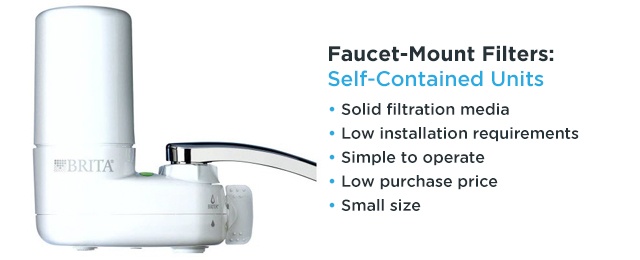
In terms of faucet-mount filters, there are actually two different types typically available. The first type is a self-contained faucet-mount filter, which mounts entirely on a kitchen faucet.
Because of their smaller size, self-contained faucet-mount filters may be found in many types of retail stores or department stores. Self-contained faucet-mount filters generally have the following attributes:
- Solid filtration media: These filters typically use activated carbon in a solid carbon block cartridge format as their filtration media.
- Low installation requirements: While not as simple as a filtered water pitcher, a faucet-mount water filter is easy to install. It typically needs to be attached to the end of most faucets. Faucet thread adapters are usually included to help ensure a connection can be made, depending on the type and size of the faucet.
- Simple to operate: Turn on the faucet, and then press a switch, button, or lever to divert the water through the filter and out the spout.
- Low purchase price: Self-contained faucet-mount filters, due to their smaller size, tend to cost only slightly more than a filtered water pitcher and typically retail for less than $100.
- Small size: Because of their size, self-contained faucet-mount filters have a similar filter capacity to filtered water pitchers and generally require a filter change every two months.
How do self-contained faucet-mount filters perform?
- Solid carbon block filters prevent water channeling that occurs with GAC.
- They do not waste water – all the water passes through the filter and is usable.
- They do not require external power.
- Their carbon block filters can sometimes reduce a relatively extensive range of contaminants, including sediment and heavy metals. A few advanced models may also reduce levels of chemical products like pharmaceuticals.
What are the downsides to self-contained faucet-mount filters?
- The small size of the filter cartridge limits the contact time between the water and the filter media, limiting its performance.
- They require active water pressure to force the water to pass through the filter. If the water pressure is too low, it will not work.
- Depending on the brand and type of filter, a self-contained faucet-mount filter can vary in capabilities. Some are limited only to treating the taste and odor of water.
- Self-contained faucet-mount filters require replacement filters every one to three months on average.
- They typically have a limited warranty, averaging 90 days to two years.
Faucet-Mount Filters: Countertop Drinking Water Systems
The other type of faucet-mount filter is a countertop drinking water system, whose main body sits near the sink, with a nozzle designed to attach to the kitchen faucet.
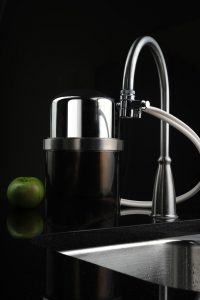
Due to their larger size, countertop drinking water systems may be more commonly found in hardware stores or online storefronts. Countertop drinking water systems generally have the following attributes:
- Various filtration media: The type of filters varies depending on the brand and model. Some use GAC similar to filtered water pitchers, while others – including Multipure – use activated carbon in a solid carbon block cartridge format for their filters.
- Low installation requirements: The hose and diverter valve needs to be attached to the main system housing and to the faucet. Faucet thread adapters are usually included to help ensure a connection can be made, depending on the type and size of the faucet.
- Simple to operate: Turn on the faucet, and then press a switch, button, or lever to divert the water through the filter and out the spout.
- Cost-effective: Countertop drinking water systems are larger than self-contained faucet mount filters but tend to offer more options for installation. They generally cost a few hundred dollars.
- Long-lasting filters: Countertop systems have a much larger filter capacity and typically require a filter change only once a year.
How do countertop drinking water systems perform?
- Countertop drinking water systems often treat a much broader array of contaminants than other water filtration devices. They treat everything that a GAC filter will treat, and when they use a solid carbon block, they will treat contaminants that can be hazardous to health. Some filters can even treat bacteria and viruses in drinking water.
- Faucet filtration systems like Multipure's Aquaversa and Aquaperform reduce contaminants like asbestos, cysts, particulates, pesticides such as chlordane, lead, mercury, and volatile organic compounds, among many others.
- The Aquaperform and Aqualuxe additionally reduce contaminants like arsenic V, radon, the pesticide DEET, and pharmaceutical products like ibuprofen and naproxen.
- Systems using a large solid carbon block filter both prevent water channeling and ensure a longer contact time with the water due to increased filtration surface area; these carbon block systems provide more effective filtration overall.
- Multipure’s Aqualuxe is NSF-certified as a water purifier because it can purify drinking water of bacteria, viruses, and live cysts. It also filters the cyanotoxin known as microcystin, which comes from blue-green algae.
- The larger filter cartridge equals a much higher capacity. For example, one of the Multipure Aquaversa countertop filter cartridges has a capacity of 750 gallons. That is vastly larger than both filtered water pitchers — generally 20-40 gallon capacity — and self-contained faucet-mount filters — generally 40-100 gallon capacity.
- They do not waste water – all the water passes through the filter and is usable.
- They do not require external power.
- Multipure countertop drinking water systems have a lifetime warranty on the system housing.
What are the downsides to countertop drinking water systems?
- Because their solid carbon block filter is densely compacted, they require active water pressure to force the water to pass through the filter. If the water pressure is too low, it will not work.
- Depending on the brand and type of filter, countertop drinking water systems can vary in capabilities; some are limited only to treating the taste and odor of water.
- Countertop drinking water systems take up physical space on the countertop near the sink.
Filtered Water Pitchers and Faucet Mount Filters from Multipure
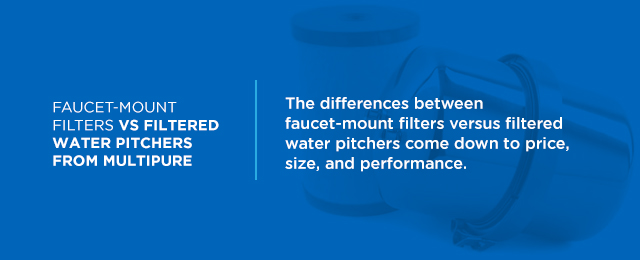
The differences between faucet-mount filters versus filtered water pitchers come down to price, size, and performance. Filtered water pitchers are the cheapest but offer the least amount of filtration performance. Self-contained faucet-mount filters offer better filtration performance than filtered water pitchers but at a low capacity. Countertop drinking water systems cost more but provide the highest filter capacity and the most powerful and versatile performance of the three types.
At Multipure, our faucet-mount filters consist of countertop drinking water systems. What sets our products apart is the broad array of contaminants treated by our systems and our robust third-party testing and verification through NSF International – such as the Aqualuxe’s NSF certification for
Standard P231.
All of Multipure’s countertop systems are NSF-certified to treat
contaminants under NSF Standard 42, which covers aesthetic contaminants, such as chlorine, chloramine, and particulates, and 53, which covers health contaminants, such as asbestos, lead, and VOCs. Multipure also offers countertop systems that are NSF-certified under Standard 53 to treat contaminants like PFOA/PFOS, NSF-certified under Standard 401 to treat emerging compounds and incidental contaminants, such as pharmaceuticals, herbicides, and pesticides, and NSF-certified under Standard P231, which governs microbiological purifiers that treat bacteria, viruses, and live cysts.
In addition, all of Multipure’s drinking water systems feature a lifetime warranty on the system housing, on top of a 90-day money-back guarantee if you’re not satisfied with the system. Most filtered water pitchers and self-contained faucet-mount filters have a warranty that ranges from 90 days to two years, at most.
So, when you're considering the types of water filters to purchase, remember to consider not just the price but also the capabilities and performance. Ultimately, when it comes to drinking water treatment, you get what you pay for.
You can also take a listen to our podcast about faucet mounts.

